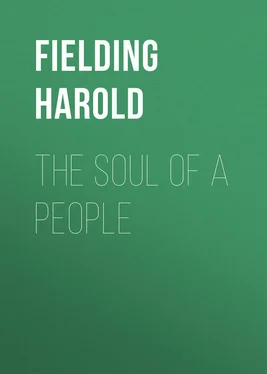Harold Fielding - The Soul of a People
Здесь есть возможность читать онлайн «Harold Fielding - The Soul of a People» — ознакомительный отрывок электронной книги совершенно бесплатно, а после прочтения отрывка купить полную версию. В некоторых случаях можно слушать аудио, скачать через торрент в формате fb2 и присутствует краткое содержание. Жанр: foreign_religion, foreign_antique, foreign_prose, на английском языке. Описание произведения, (предисловие) а так же отзывы посетителей доступны на портале библиотеки ЛибКат.
- Название:The Soul of a People
- Автор:
- Жанр:
- Год:неизвестен
- ISBN:нет данных
- Рейтинг книги:5 / 5. Голосов: 1
-
Избранное:Добавить в избранное
- Отзывы:
-
Ваша оценка:
- 100
- 1
- 2
- 3
- 4
- 5
The Soul of a People: краткое содержание, описание и аннотация
Предлагаем к чтению аннотацию, описание, краткое содержание или предисловие (зависит от того, что написал сам автор книги «The Soul of a People»). Если вы не нашли необходимую информацию о книге — напишите в комментариях, мы постараемся отыскать её.
The Soul of a People — читать онлайн ознакомительный отрывок
Ниже представлен текст книги, разбитый по страницам. Система сохранения места последней прочитанной страницы, позволяет с удобством читать онлайн бесплатно книгу «The Soul of a People», без необходимости каждый раз заново искать на чём Вы остановились. Поставьте закладку, и сможете в любой момент перейти на страницу, на которой закончили чтение.
Интервал:
Закладка:
No teacher more full of reverence, more humble than Gaudama the Buddha ever lived to be an example to us through all time. He tells us of what he knows; of what he knows not he is silent. Of the laws that he can see, the great sequences of life to death, of evil to sorrow, of goodness to happiness, he tells in burning words. Of the beginning and the end of the world, of the intentions and the ways of the great Unknown, he tells us nothing at all. He is no prophet, as we understand the word, but a man; and all that is divine in him beyond what there is in us is that he hated the darkness and sought the light, sought and was not dismayed, and at last he found.
And yet nothing could be further from the truth than to call the Buddha a philosopher and Buddhism a philosophy. Whatever he was, he was no philosopher. Although he knew not any god, although he rested his claims to be heard upon the fact that his teachings were clear and understandable, that you were not required to believe, but only to open your eyes and see, and 'his delight was in the contemplation of unclouded truth,' yet he was far from a philosopher. His was not an appeal to our reason, to our power of putting two and two together and making five of them; his teachings were no curious designs woven with words, the counters of his thought. He appealed to the heart, not to the brain; to our feelings, not to our power of arranging these feelings. He drew men to him by love and reverence, and held them so for ever. Love and charity and compassion, endless compassion, are the foundations of his teachings; and his followers believe in him because they have seen in him the just man made perfect, and because he has shown to them the way in which all men may become even as he is.
He was a prince in a little kingdom in the Northeast of India, the son of King Thudoodana and his wife Maia. He was strong, we are told, and handsome, famous in athletic exercises, and his father looked forward to the time when he should be grown a great man, and a leader of armies. His father's ambition for him was that he should be a great conqueror, that he should lead his troops against the neighbouring kings and overcome them, and in time make for himself a wide-stretching empire. India was in those days, as in many later ones, split up into little kingdoms, divided from each other by no natural boundary, overlooked by no sovereign power, and always at war. And the king, as fathers are, was full of dreams that this son of his should subdue all India to himself, and be the glory of his dynasty, and the founder of a great race.
Everything seemed to fall in with the desire of the king. The prince grew up strong and valiant, skilled in action, wise in counsel, so that all his people were proud of him. Everything fell in with the desire of the king except the prince himself, for instead of being anxious to fight, to conquer other countries, to be a great leader of armies, his desires led him away from all this. Even as a boy he was meditative and given to religious musings, and as he grew up he became more and more confirmed in his wish to know of sacred things, more and more an inquirer into the mysteries of life.
He was taught all the faith of those days, a faith so old that we do not know whence it came. He was brought up to believe that life is immortal, that no life can ever utterly die. He was taught that all life is one; that there is not one life of the beasts and one life of men, but that all life was one glorious unity, one great essence coming from the Unknown. Man is not a thing apart from this world, but of it. As man's body is but the body of beasts, refined and glorified, so the soul of man is but a higher stage of the soul of beasts. Life is a great ladder. At the bottom are the lower forms of animals, and some way up is man; but all are climbing upwards for ever, and sometimes, alas! falling back. Existence is for each man a great struggle, punctuated with many deaths; and each death ends one period but to allow another to begin, to give us a new chance of working up and gaining heaven.
He was taught that this ladder is very high, that its top is very far away, above us, out of our sight, and that perfection and happiness lie up there, and that we must strive to reach them. The greatest man, even the greatest king, was farther below perfection than an animal was below him. We are very near the beasts, but very far from heaven. So he was taught to remember that even as a very great prince he was but a weak and erring soul, and that unless he lived well, and did honest deeds, and was a true man, instead of rising he might fall.
This teaching appealed to the prince far more than all the urging of his father and of the courtiers that he should strive to become a great conqueror. It entered into his very soul, and his continual thought was how he was to be a better man, how he was to use this life of his so that he should gain and not lose, and where he was to find happiness.
All the pomp and glory of the palace, all its luxury and ease, appealed to him very little. Even in his early youth he found but little pleasure in it, and he listened more to those who spoke of holiness than to those who spoke of war. He desired, we are told, to become a hermit, to cast off from him his state and dignity, and to put on the yellow garments of a mendicant, and beg his bread wandering up and down upon the world, seeking for peace.
This disposition of the prince grieved his parents very much. That their son, who was so full of promise, so brave and so strong, so wise and so much beloved by everyone, should become a mendicant clad in unclean garments, begging his daily food from house to house, seemed to them a horrible thing. It could never be permitted that a prince should disgrace himself in this way. Every effort must be taken to eradicate such ideas; after all, it was but the melancholy of youth, and it would pass. So stringent orders were given to distract his mind in every way from solemn thoughts, to attempt by a continued round of pleasure and luxury to attract him to more worldly things. And when he was eighteen he was married to his cousin Yathodaya, in the hope that in marriage and paternity he might forget his desire to be a hermit, might feel that love was better than wisdom. And if Yathodaya had been other than she was – who can tell? – perhaps after all the king might have succeeded; but it was not to be so. For to Yathodaya, too, life was a very solemn thing, not to be thrown away in laughter and frivolity, but to be used as a great gift worthy of all care. To the prince in his trouble there came a kindred soul, and though from the palace all the teachers of religion, all who would influence the prince against the desires of his father, were banished, yet Yathodaya more than made up to him for all he had lost. For nearly ten years they lived together there such a life as princes led in those days in the East, not, perhaps, so very different from what they lead now.
And all that time the prince had been gradually making up his mind, slowly becoming sure that life held something better than he had yet found, hardening his determination that he must leave all that he had and go out into the world looking for peace. Despite all the efforts of the king his father, despite the guards and his young men companions, despite the beauty of the dancing-girls, the mysteries of life came home to him, and he was afraid. It is a beautiful story told in quaint imagery how it was that the knowledge of sickness and of death came to him, a horror stalking amid the glories of his garden. He learnt, and he understood, that he too would grow old, would fall sick, would die. And beyond death? There was the fear, and no one could allay it. Daily he grew more and more discontented with his life in the palace, more and more averse to the pleasures that were around him. Deeper and deeper he saw through the laughing surface to the depths that lay beneath. Silently all these thoughts ripened in his mind, till at last the change came. We are told that the end came suddenly, the resolve was taken in a moment. The lake fills and fills until at length it overflows, and in a night the dam is broken, and the pent-up waters are leaping far towards the sea.
Читать дальшеИнтервал:
Закладка:
Похожие книги на «The Soul of a People»
Представляем Вашему вниманию похожие книги на «The Soul of a People» списком для выбора. Мы отобрали схожую по названию и смыслу литературу в надежде предоставить читателям больше вариантов отыскать новые, интересные, ещё непрочитанные произведения.
Обсуждение, отзывы о книге «The Soul of a People» и просто собственные мнения читателей. Оставьте ваши комментарии, напишите, что Вы думаете о произведении, его смысле или главных героях. Укажите что конкретно понравилось, а что нет, и почему Вы так считаете.












